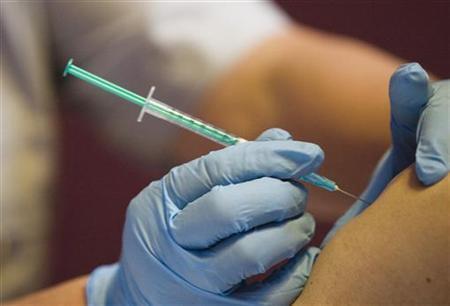You’re better off getting your flu shot in the morning than in the afternoon, researchers from England say.
“This is a free (course of action) that could seriously boost older adults’ vaccination response with no adverse effects,” Dr. Anna C. Phillips from University of Birmingham told Reuters Health by email.
Vaccines work by getting the immune system to produce infection-fighting antibodies that swing into action upon exposure to the actual disease.
Because a person’s immune response varies through the course of the day, some researchers have suggested that vaccines might work better if they’re given at some times of the day rather than at other times.
Phillips’s team randomly assigned 276 older adults to receive an influenza vaccine in the morning (9-11 AM) or in the afternoon (3-5 PM).
One month later, they analyzed blood samples from each person to measure antibodies against the flu virus.
Antibody levels went up in both groups, but the increases were significantly higher for those who got vaccinations in the morning instead of in the afternoon, the authors reported in the journal Vaccine.
Men and women both showed better responses after the morning vaccination.
The researchers looked at a variety of immune and hormone factors, but none could explain what they were seeing. “We don’t yet know exactly how this morning effect is working,” Phillips said.
The study only looked at antibody levels, not at whether people actually got the flu later on.
Still, Phillips advises, “Don’t wait for the definitive trial to check that the increased levels of antibodies relate to decreased disease risk. We know that’s what antibodies do . . . so start this now.”
But Dr. Bruce Y. Lee, director of operations research for Johns Hopkins Bloomberg School of Public Health’s International Vaccine Access Center in Baltimore, Maryland, warned, “We should be careful about jumping to conclusions from the study.”
“Many people already struggle to find time to get the flu vaccine,” Lee told Reuters Health by email. “They find it difficult to miss work or take time out of the day to go to a clinic or somewhere else to get the flu vaccine. The afternoon or the evening may be the only time of day that people can get the vaccine. You don’t want people thinking that the vaccine is only effective if given in the morning or that people should wait a long while until they have a morning available.”
“Ultimately,” he said, “if future studies indeed confirm that time of day may make a difference, then flu vaccination needs to become much more convenient; for example, employers offer them at work. Our previous studies have shown that doing so can save employers costs.”
Source: REUTERS











